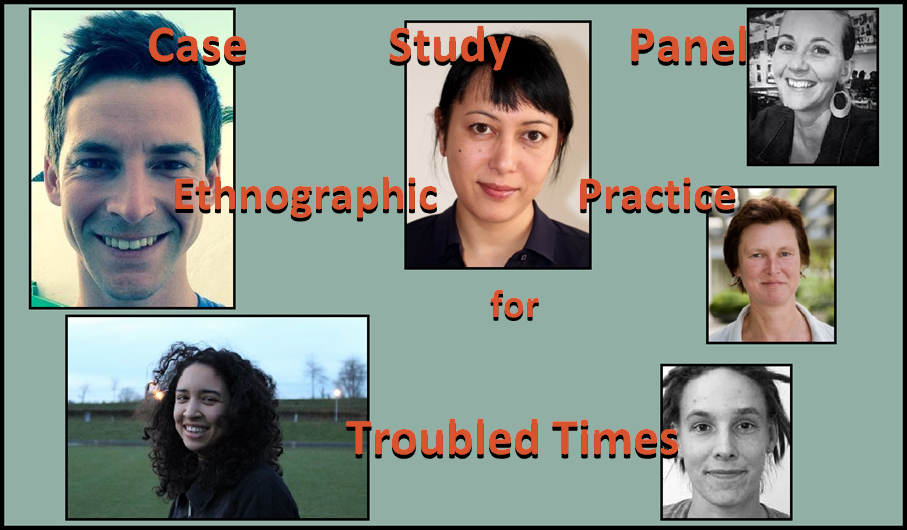 Ethnographic practice for troubled times
Ethnographic practice for troubled times
This panel will explore how the ethnographic practices of an engaged anthropology can shed new light on contemporary power struggles and the contentious field of activism in different parts of the world. Presenting recent case studies from the Netherlands, Ukraine, and South Africa, the speakers will illustrate the range of possibilities and challenges faced not only by the social actors in their research, but also by the anthropologist in navigating conflicting interests and ideologies. What strategies can social actors, including anthropologists, utilize to shape meaningful outcomes of their struggles and their research?
Power and Politics in Stakeholder Engagement: Farm Dweller (in)Visibility, Violence and Conversions to Game Farming in South Africa, by Femke Brandt, Jenny Josefsson & Marja Spierenburg
Our paper addresses impacts of conversions of private farms to game farms in the Eastern Cape and KwaZulu-Natal provinces, South Africa. Focusing on farm workers and dwellers as one of the most marginalized groups, the study challenged the perception of game farming as a ‘win-win’ for nature conservation and rural development and extended this narrow technical and economic framing to include the political meanings and contestations of the conversions. The paper reflects on multi-stakeholder workshops organized to disseminate our research findings amongst stakeholders and find ways to mitigate negative impacts of conversions. The main challenge appeared to be that farm workers and dwellers were not recognized as stakeholders by the other stakeholders involved. This ‘invisibility’ has multiple reasons, including the specific historical and current trajectories of land dispossession. It is further linked to institutional and personal relations in the two provinces, resulting in different uses of the workshop spaces.
Vested Interests and Competing Visions: the Ethics of Engaging with Mission-oriented NGOs in a Post-crisis Landscape, by Nick Massey
How does an engaged anthropologist choose an organisation to work with? What research biases does this decision produce and how can they be mitigated? What are the ethics of looking over the ‘other side of the fence’ and hearing from other organisations whilst ‘officially’ attached to one’s original choice? What does one do with the ‘dirt’ that representatives of NGOs spill on each other to persuade the anthropologist – and, indeed, themselves – of the correctness of their own organisation’s vision? Drawing on applied anthropological research with the Ukrainian NGO ‘Crimea SOS’ in Kyiv, I will explore the ethics of working with an organisation whose position in the post-crisis landscape differs markedly from others’. What anthropological insights might be gleaned from analysing these competing visions and responses? What do they tell us about how NGOs function in post-crisis Ukraine? Finally, how can engaged anthropology in such a contested landscape inform future ethnographic practice?
Decolonizing Knowledge: Tracing Pasts & Disturbing Innocence in the Netherlands, by Sherilyn Deen
Drawing from fieldwork conducted between August 2017 and January 2018, I argue that decolonial activists enact decolonial realities through practices of tracing the colonial past into the present. They aim to uncover different and less widely-known historical ‘facts’ but especially address how dominant understandings of those historical ‘facts’ often fail to affect emotional and moral experiences in the present. Decolonial activists trace the colonial past through what Markus Balkenhol has called ‘a brutal project of savagery’, in order to disrupt a knowing and caring for the Dutch nation as an innocent, highly moral and civilized nation. It involves a breaking with a modernist notion of time as linear and teleological by folding violent and oppressive pasts into the present. To understand the burning issue of decolonization it is thus important to be attentive to the temporal entanglements and structures of feeling underlying these social and political dynamics.
Speakers
Femke Brandt (University of Johannesburg), Jenny Josefsson (University of the Free State) & Marja Spierenburg (Radboud Universiteit Nijmegen)
Nick Massey, MSc Social and Cultural Anthropology, University of Amsterdam
Sherilyn Deen, MSc Social Sciences, University of Amsterdam
This panel will be moderated by Yatun Sastramidjaja (University of Amsterdam).
